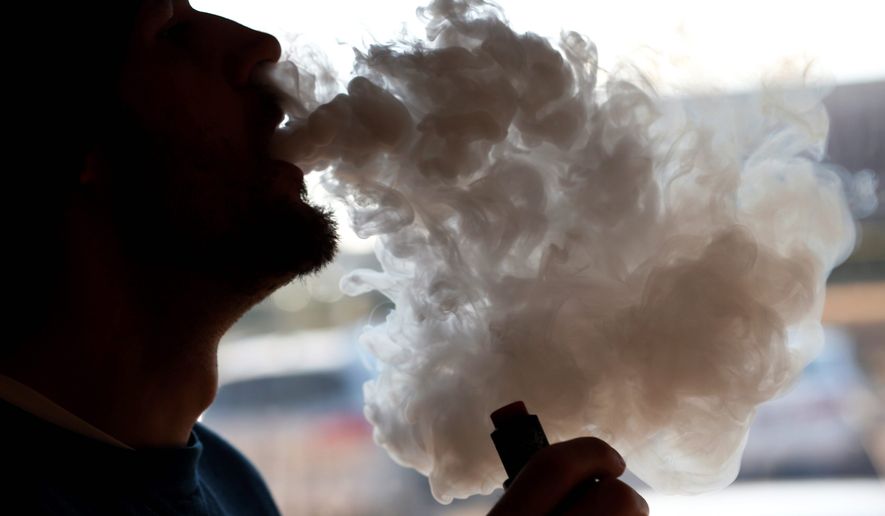The Food and Drug Administration has told a federal court that the agency, not the court, should set its timeline to review thousands of electronic cigarette products in response to a lawsuit filed last year.
No FDA-authorized e-cigarettes are on the market.
The FDA said that if the court decides to set a timeline, then it should give manufacturers at least 10 months to submit product applications and the agency a year to review them.
“This timeline would help address the serious public health concern of migration from non-combustible to combustible forms of tobacco, if e-cigarettes were to abruptly exit the market, and would give manufacturers time to prepare higher quality applications,” the FDA told The Washington Times on Thursday.
The FDA published its final application guidance for e-cigarette makers this week. It outlines recommendations for manufacturers to consider the risks and benefits of a product and the likelihood that users will stop using the product and nonusers will start.
The FDA asked the court Wednesday evening for another 120 days to finalize its policy on e-cigarette marketing to limit access to children.
U.S. District Judge Paul W. Grimm in Maryland ordered the FDA almost a month ago to speed up its review of thousands of vaping products.
The American Academy of Pediatrics, the Campaign for Tobacco-Free Kids and other advocacy groups filed a federal lawsuit last year after the FDA postponed its premarket review for tobacco products until 2021 and 2022.
Dennis Henigan, vice president of legal and regulatory affairs for the Campaign for Tobacco-Free Kids, said halting the FDA’s review has led to increased use of e-cigarettes among youths and has raised public health risks.
“Given that FDA’s failure to adhere to its legal responsibilities has contributed to the ongoing epidemic of youth usage of e-cigarettes, the agency’s position that it should be trusted to set its own timeline for premarket review is completely unacceptable,” Mr. Henigan told The Times. “Further FDA delay is legally unjustified and would be adverse to public health, particularly to the millions of young people exposed to nicotine addiction by the e-cigarette epidemic.”
He said e-cigarette use among high school students and middle school students has risen dramatically.
Last year, 3.6 million middle and high school students nationwide used e-cigarettes, up from 1.5 million in 2017, the FDA said.
The agency acknowledged the vaping epidemic among youths but said its response and proposed remedy “reflects the agency’s strong commitment to reversing the trend of youth vaping.”
In its brief to the U.S. District Court, the FDA said the plaintiffs’ proposal of four months was a “precipitous deadline [that] would threaten to abruptly clear the market of e-cigarette products.”
A disruption in the market for e-cigarettes and vaping products would create a “genuine risk” of adult former smokers returning to more harmful traditional cigarettes, the FDA said.
Gregory Conley, president of the American Vaping Association, said it makes sense for the FDA to delay its review, but he expressed concern that the agency’s guidelines will surrender the market to large tobacco companies and cost manufacturers millions of dollars to keep a product on the market.
“It is perverse that cigarette companies get to subsidize their applications for reduced-harm products with money made by selling products that are killing people,” Mr. Conley told The Times. “Meanwhile, independent companies don’t have access to the huge amount of resources that will be necessary to remain in business in America.”
He said the FDA regulations could force thousands of vaping retailers and manufacturers out of business.
“What we fear is that FDA regulations is actually going to worsen public health by decreasing the attractiveness of these products to adult smokers such as by removing nearly every flavor of vaping products from the market,” Mr. Conley said.
He said the vast majority of youth e-cigarette use is experimental.
Mr. Henigan, though, said data shows an increasing number of young people using vaping products for longer periods, indicating “far more than experimental use” and signs of addiction.
• Shen Wu Tan can be reached at stan@washingtontimes.com.




Please read our comment policy before commenting.